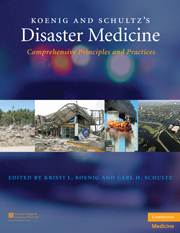Book contents
- Frontmatter
- Contents
- List of Contributors
- Contributor Biographies
- Foreword
- Preface
- Acknowledgments
- PART I CONCEPTUAL FRAMEWORK AND STRATEGIC OVERVIEW
- 1 Disaster Research and Epidemiology
- 2 Disaster Education and Training: Linking Individual and Organizational Learning and Performance
- 3 Surge Capacity
- 4 International Perspectives on Disaster Management
- 5 Ethical Issues in Disaster Medicine
- 6 Emerging Infectious Diseases: Concepts in Preparing for and Responding to the Next Microbial Threat
- 7 Disaster Mental and Behavioral Health
- 8 Special Needs Populations
- PART II OPERATIONAL ISSUES
- PART III CLINICAL MANAGEMENT
- Index
- Plate section
- References
5 - Ethical Issues in Disaster Medicine
from PART I - CONCEPTUAL FRAMEWORK AND STRATEGIC OVERVIEW
Published online by Cambridge University Press: 05 August 2011
- Frontmatter
- Contents
- List of Contributors
- Contributor Biographies
- Foreword
- Preface
- Acknowledgments
- PART I CONCEPTUAL FRAMEWORK AND STRATEGIC OVERVIEW
- 1 Disaster Research and Epidemiology
- 2 Disaster Education and Training: Linking Individual and Organizational Learning and Performance
- 3 Surge Capacity
- 4 International Perspectives on Disaster Management
- 5 Ethical Issues in Disaster Medicine
- 6 Emerging Infectious Diseases: Concepts in Preparing for and Responding to the Next Microbial Threat
- 7 Disaster Mental and Behavioral Health
- 8 Special Needs Populations
- PART II OPERATIONAL ISSUES
- PART III CLINICAL MANAGEMENT
- Index
- Plate section
- References
Summary
OVERVIEW
Disaster situations present numerous moral and ethical challenges at the micro, meso, and macro levels. These dilemmas embroil not only patients and their providers, but they also involve a variety of stakeholders outside the doctor–patient dyad: peers, provider organizations, the press, the general public, payers, policymakers, politicians, public health leaders, and even corporate interests in the private sector. This group of moral agents may be considered the “Ten Ps” (Table 5.1). The principles and concepts in this chapter are relevant to all candidate stakeholder and disaster organizations as well as individuals. This chapter first acknowledges the spectrum of medical–ethical and moral problems inherent in disaster preparedness and response, while focusing primarily on those that impact healthcare workers as individuals working in the trenches. After exploring some of the disaster-relevant bioethical principles and codes of conduct, it describes the fundamental virtues that inform ethical decision making in clinics, hospitals, and emergency departments and in the field in the immediate aftermath of a disaster.
CURRENT STATE OF THE ART
The Spectrum of Disaster Dilemmas
Although thoughts of disaster ethics generally conjure up visions of distributing life vests on a sinking Titanic, there are many other less dramatic examples of ethical challenges that confront the clinician working in the wake of a catastrophe. The broad array of potential ethical dilemmas in a disaster situation is vast and involves both individual and corporate actions.
Keywords
- Type
- Chapter
- Information
- Koenig and Schultz's Disaster MedicineComprehensive Principles and Practices, pp. 62 - 74Publisher: Cambridge University PressPrint publication year: 2009
References
- 4
- Cited by

